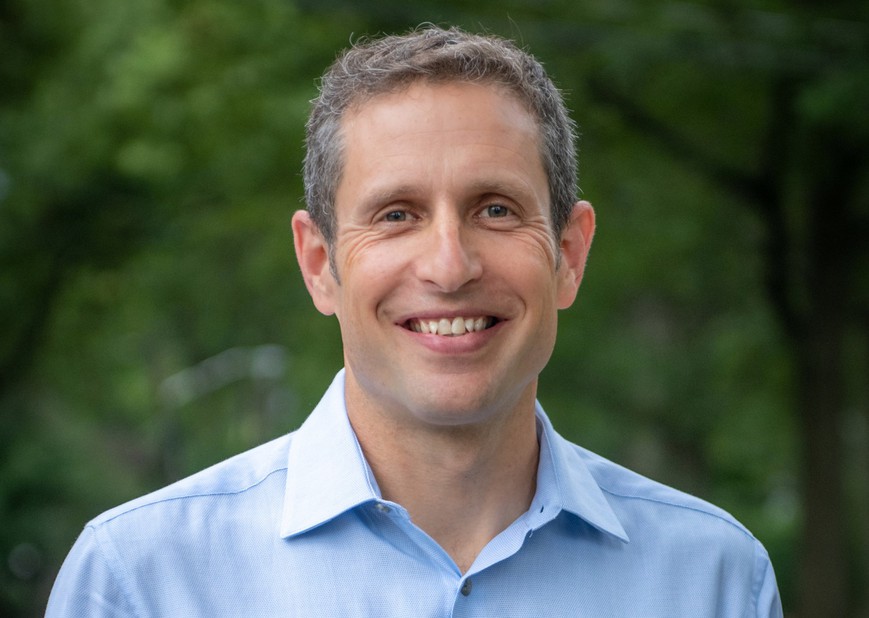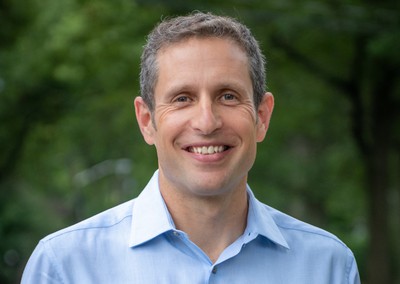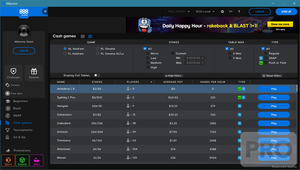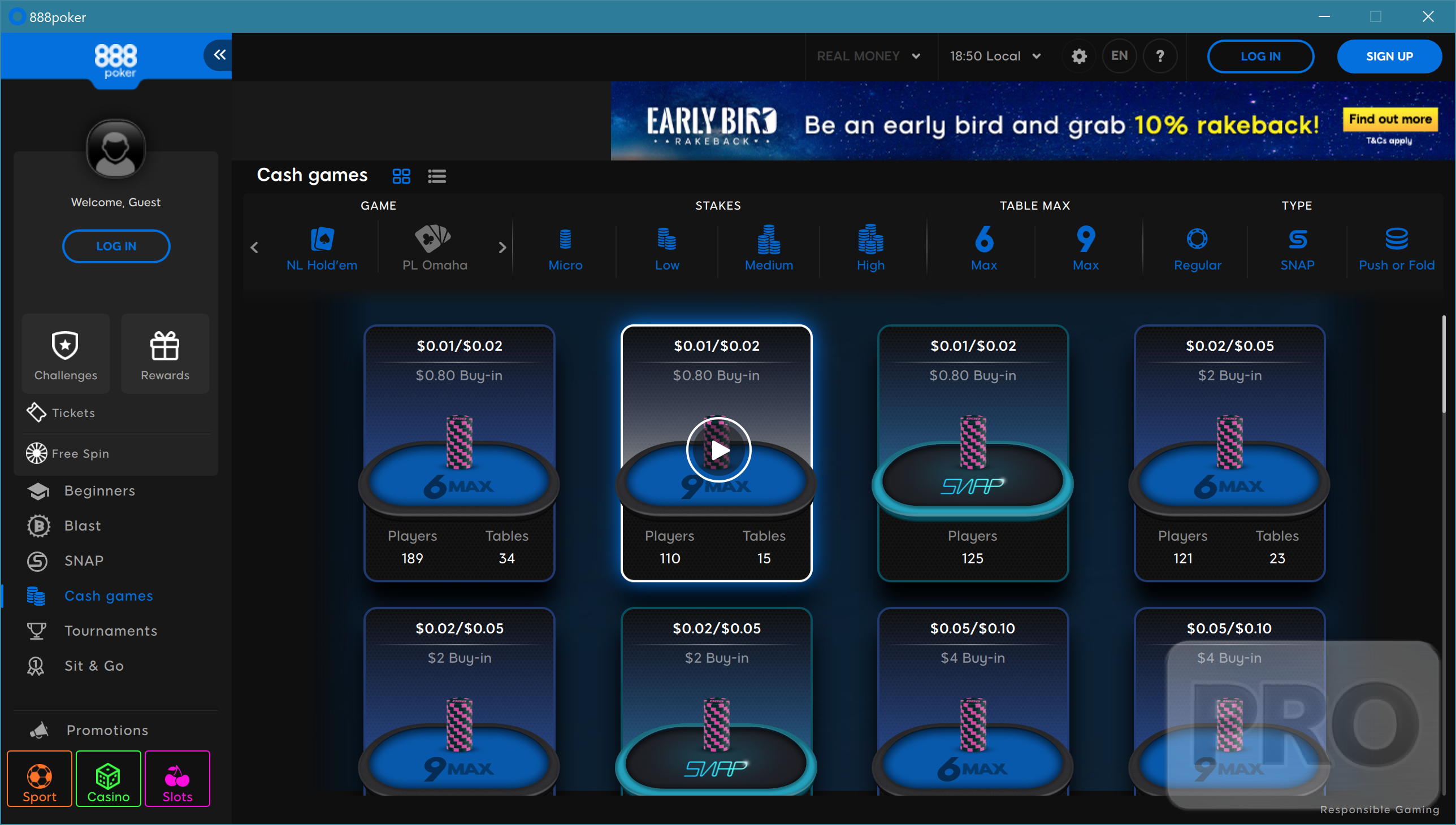

I expect that we’ll see an expanded shared liquidity network inside 2021. That’s my main expectation.
888 provides the software platform for the largest interstate online poker network in the United States. Its All American Poker Network powers its own 888 New Jersey, but it is perhaps better known as the platform that powers two World Series of Poker apps: WSOP.com New Jersey and WSOP.com Nevada.
And that network is set to grow both geographically, with new US states coming soon, and as a platform, with its all new Poker 8 desktop and mobile app in the pipeline for US states, pokerfuse has been told.
In a wide-ranging interview, pokerfuse spoke with Yaniv Sherman, SVP and Head of US at 888 Holdings, to discuss 888’s plans for the new American poker environment. And it is clear that the company sees big potential in the expansion of legal, safe regulated online poker across the United States.
First, the recent launch of online poker in Michigan opens up the opportunities there, as does the recently regulated Pennsylvania online poker market. Sherman tells pokerfuse that the company is prioritizing the launch of WSOP PA and the aim is that this will come with the new Poker 8 platform.
The goal is to be ready for the 2021 WSOP Summer festival. If they can pull it off, it could mean players in Pennsylvania will be able to compete for WSOP bracelets this year from their home.
The company will then look to roll out the Poker 8—which represents a complete overhaul of the online poker experience, with updates to both Windows and Mac clients, as well as Android and iOS—to other states as soon as possible.
Poker is right up there with sports. I do think that over the next 12 to 18 months we’ll see existing states compact with each other.
Then there is the favorable decision handed down by the US Court of Appeals on the scope of the Wire Act significantly altering the online poker landscape in the US.
Sherman told pokerfuse that they had started the licensing process in Michigan, but indicated that the launch may hinge on whether the regulator will pursue shared liquidity. Currently, PokerStars Michigan is the only online poker room in the state.
He is overall bullish on the possibility of more states allowing cross-border networks, noting West Virginia as one specific example.
Read below for the full interview, which covers the threat of offshore operators, their approach to brand ambassadors in the US, real names at the tables and a whole more.
Poker 8, Pennsylvania and Michigan
When will we begin seeing the rollout of the new Poker 8 platform, and which states do you anticipate will come first, or will it rollout to all regulated US markets at the same time?
 Right now, we are looking to prioritize Pennsylvania with our partner Caesars to deploy it for the WSOP brand. We then will aim for a phased rollout across the states.
Right now, we are looking to prioritize Pennsylvania with our partner Caesars to deploy it for the WSOP brand. We then will aim for a phased rollout across the states.
The recent First Circuit ruling threw a few of the cards in the air because now we are hoping to try and pool some of the existing states together at some point, but that’s still a work in progress. We’re talking to the various regulators to make sure that we have the infrastructure in place. We’re focusing on Pennsylvania and our new infrastructure.
It’s not just Poker 8, we are deploying a whole new platform backend with a lot of new capabilities that we’ve been working on globally. Then we will start rolling out Poker 8, in Pennsylvania first, and then hopefully the other states, and new states will follow hopefully this year.
When do you expect to go live in Pennsylvania? Will you go live initially with Poker 8, or do you anticipate that you could launch there and then deploy Poker 8 at a later time?
The plan is to go live with Poker 8. The work is ongoing. Naturally, pending certification, so that is up to the regulator. We are working hard to go live the first half of the year, hopefully sooner, but right now that is our plan – sometime during the first half of 2021 to go live.
We are aiming to be there in time for the WSOP tournament, which I hope that we’ll be able to see it back. I don’t know if we will. Any way that Caesars would want to schedule that, typically in mid-year, they want to run the tournaments, so we are trying to meet that timeline.

Last we checked, we didn’t see an application for 888 in Michigan. What more can you tell us about your status in that state?
We’ve already initiated our licensing process in Michigan. The regulator is still very much focused on getting most operators live on sports and casino.We are definitely looking at bringing 888poker to other states as well.
That has already been initiated and is in motion. We’ve started our discussions, and depending on their position on shared liquidity, that will determine the timing of when we can launch Michigan as well. Naturally, we are hoping to do that hopefully with other states in mind.
888 Brands in the United States
888 has a big B2B presence in the US through its partnerships with WSOP.com and the racinos in Delaware. So far we have only seen an 888poker branded online poker room in New Jersey. Are there plans to have that brand associated with online poker in other states when you launch?
First of all, we are making sure that we get WSOP rolled out in the additional state, Pennsylvania, and then Michigan. We are definitely looking at bringing 888poker to other states as well.
As you can imagine, when we deploy our infrastructure and Poker 8 into those states, then the incremental work for investment to deploy 888poker is much less substantial. In that regard, I think that 888poker will be riding on the same trend where we can connect as many states to the shared liquidity pool as possible.
It will be a much smoother or more cost-effective way of deploying it. I can’t get into too many details, but we are definitely working to extend and expand 888poker the network beyond New Jersey, hopefully, in the near future.
As far as branding goes, we saw, initially, with the rollout in New Jersey, the All-American Poker Network was a brand that 888 was trying to push. It seems like that has lessened in recent years. I’m just wondering if that is a brand that you plan to revive with the new opportunities for shared liquidity across the states?
That is a good question. I think that brand or that joint venture that we had with Avenue Capital back in the day was struck in 2012, early 2013 when poker was the frontrunner for all US regulated gaming, and casino was just available in Delaware and New Jersey. I don’t think that the All-American Poker Network is necessarily the brand that we would get behind. I think 888poker has just as much, if not more, brand equity in North America.
That was the anomaly, but what we expected back then was for poker to roll out much faster across the US because it was less contentious than casino.
What happened in practice was poker was a lot slower to be adopted. I think mostly because a lot less operators felt that they could participate, so that trend subsided and everything reemerged on the back of the PASPA repeal in 2018. Gaming in general, along with sports betting, has taken the front stage.
I don’t think that the All-American Poker Network is necessarily the brand that we would get behind. I think 888poker has just as much, if not more, brand equity in North America. I think that it is definitely a question that we are still asking, but unless proven otherwise, I think 888poker is a very effective brand.
Generally speaking, I think poker now, you can look at this as a three-wave approach. We’ve had gaming, initially, on the back burner, then sport arrived and washed over everything from 2018 until probably late 2019. I think gaming is getting back to center stage because everybody understands how much more you can do with more than just sport.
In gaming, everybody is talking about casino, which is great because it leaves much less competition in the poker vertical, and that is what we are building on. I think that poker will always be the smallest product. I just think it gets so much bigger than what it is right now on the back of the shared liquidity, and that we have the opportunity to take a bigger piece of maybe a smaller pie.
But nevertheless, I think it is going to be much more substantial with what we are already seeing, which is, right now, between New Jersey, Delaware, Nevada, Michigan, Pennsylvania, I think we are looking at well north of about $200 maybe $250 million worth of total addressable market with only two or three potential players or operators on it. It is definitely a very big opportunity, at least from our perspective.
Wire Act and Shared Liquidity
Let’s take a wider view of shared liquidity and the recent Wire Act decision. How do you see that decision changing the landscape for online poker in the US? What changes do you expect to immediately happen in 2021?
I think that what it did is mostly remove the uncertainty that engulfed poker. I think policymakers and regulators were hesitant to take decisive action before they saw more clarity around the DOJ opinion.
Listen, poker was the main casualty for that opinion from 2018. I don’t think anybody expected e-payments or ilottery or even casino to be heavily impacted. They were all very much ringfenced inside their state lines. Sport has always been part of the Wire Act. Poker was the biggest casualty in that regard.
I think policymakers and regulators were hesitant to take decisive action before they saw more clarity around the DOJ opinion. Now that that seems to have been resolved, theoretically, they could still appeal, but it doesn’t look like that, I think regulators can move on and do one of two things or both.
One is opt to start compacting with one another. Hopefully on one shared network. We already see those conversations going.
The other thing is for other policymakers and states to move forward with their gaming initiatives. Some states that have already enacted sports betting like Indiana are now contemplating adding gaming with poker included. Perhaps bigger states like New York and other states can help the cause, but I definitely see a domino effect.
What we’ve seen in 2020, on the back of the pandemic, is the resurgence of poker as an entertainment destination. I think it is a much less contentious product on the back of sport, which is consensus more center of the road with casino being a more, let’s call it, risky – perceived at least as risky from a political standpoint.
Poker is right up there with sports. I do think that over the next 12 to 18 months we’ll see existing states compact with each other. West Virginia is another state that could very well do that, it has said that it won’t move until it sees the DOJ issue resolved.
Then new states coming on board when they can already partner or compact with the existing network will be a lot easier for new states to go live based on that than to need to set up infrastructure and operations at every state ringfenced.
Poker, of all the three gaming verticals or gambling verticals, as you well know, is more operationally demanding. Maybe we will see a couple of newcomers take a stab at this, but it is also much like daily fantasy [sports]. It’s a liquidity-based market. I think the top two or three networks will also set the tone over the next couple of years.
Do you expect anything major to happen in 2021 as a result of the recent decision?
Yes. I expect that we’ll see an expanded shared liquidity network inside 2021. That’s my main expectation.
Offshore Operators
Do you think that offshore operators pose a threat to legal regulated online poker sites in the US?
They don’t pose a threat. It’s just whenever you venture into a state, then you need to acknowledge the fact that people are already playing in that state. Once we are able to advertise on Google and on TV and create that brand awareness, the trust is there.
Much like sports betting, you have to offer them or pry them away from offshore networks. From what I know today, these aren’t the good old days between UIGEA and Black Friday.
It’s a very different landscape. I think that the offshore networks are much less dominant. There is no Full Tilt out there, there is no PokerStars. We don’t see the brands. There’s really only a couple of them out there today, but I think they’re more focused on sports betting and casino.
Generally speaking, wherever we launch, once we hit the liquidity critical mass, there is really no reason for a poker player to continue playing [offshore]. Sorry, I’ll rephrase that. For some types of players, they’ll naturally opt to play where they can create the most rake and grind, and those are mostly the sharks. Much like professional sports betters, they are price-sensitive, and they will probably play both regulated and offshore and wherever they can get their best return. We are a recreational destination.
The more states come across, once we hit that liquidity critical mass, there is really no reason for someone to play [anywhere] other than our platform, or other regulated platforms, because the products are so much better. Consumers eventually vote with their fingers and their mouses, and the customer experience is so much better from a regulated perspective.
You get the advantage of better apps, and better software, and higher stakes tournaments.
WSOP has been running six-figure Sunday guarantees for a while, covering them there beautifully—-the main events were all already millions of dollars’ worth. Offshores can’t offer that today. I think the challenge is the footprint or reach, so that’s why I think the more states we get across, then there really is no reason for someone to play [offshore]. Once we are able to advertise on Google and on TV and create that brand awareness, the trust is there.
In any regulated market, by the way, globally, once we start rolling, consumers eventually vote with their fingers and their mouses, and the customer experience is so much better from a regulated perspective. I don’t see them as a threat, but more of something that we need to continue educating players about so that they understand that they’re playing with a safe and regulated operator versus an offshore one that can, much like we’ve seen in the past, just disappear one day with players’ funds. It is mostly around education, I’m not very concerned. I think all of us have enough firepower and agenda to plow through.
Real Names and Brand Ambassadors
We know that 888poker has been one of the top operators in their use of brand ambassadors to promote its products. What’s your general philosophy about brand ambassadors as it relates to the US market?
You’re right that 888poker has done a great job over the past, I would say decade, in using brand ambassadors alongside the brand to push both a global and local agenda. Brand ambassadors should also be able to carry their personas and their influence across brands.
Just with Shane Warne and Georges St-Pierre and some of the other prominent poker players up to our WSOP winner from two years ago.
That’s definitely part of our agenda in the US, not just for poker. We at 888, in general, are looking at this with more of a holistic view, that brand ambassadors should also be able to carry their personas and their influence across brands. As far as poker is concerned, we have seen others partner with athletes and celebrities. I think it is very important, at least from poker’s perspective, that that person also enjoys playing poker. Just using someone as the face of the brand, without them actually being part of it, is, I think, not as effective.
That’s why I think Shane Warne was such an amazing brand ambassador, because he is actually a poker player. I think that is what we are looking for when we are assessing our options here in the US, and also it’s about the footprint.
I think 888poker needs to be in a few more states, and then we can really take it up a notch in terms of the brand ambassadors and partnerships we can strike. There is a great amount of interest.
To our other point about offshore bookies, most of the A-listers and the brand ambassadors that we’ve been considering will never play with offshore bookies if they are aware of the agenda. We are definitely [a company] that people want to get involved with. It’s very high up on our brand awareness and marketing operations agenda.
The last topic that I have is the use of real names at online poker tables. I was wondering if 888 has any plans to implement such a policy in the US, and I would like to get your thoughts about the use of real names at the online poker tables in general.
That’s a great topic. I reached back, by the way, to our guys, and the issue revolves – and the US is slightly different than the rest of the world, or materially different. I think the more real, or the more honest and transparent everyone is, the better for the poker industry
Just on a poker level, naturally using real names helps you with all types of bots and collusion and other fraud elements, people are recognized by their own name. It’s the same, by the way, trend as in if you want a blue check mark on Twitter, you have to use your real name as a precondition. It’s very much the same. I think, on the back of that, there are other issues that we need to tackle first that we need to look into. There’s also privacy elements around that, people being requested to identify by their real name.
I think it eventually will come down to a choice. If I have to assess how this would evolve and it will be more evolutionary than a one strike type of feature. Maybe build incentives around players who are using their own name, either be acknowledged or rewarded for it.
Overall, I think the more real, or the more honest and transparent everyone is, the better for the poker industry, because if we talk on a general note, we all know that the poker industry has suffered greatly through the years. As players evolved so did machines. The whole industry has been fighting those phenomena. We’ve been able to curtail that with several measures that we built into our existing or previous product and this one.
I think that is the bigger agenda – we’re looking at this, as I said, in a more holistic way of how do we make sure that Poker 8, much like our previous poker product, is the destination of choice for recreational [players] and novices, as opposed to just professional players. I think real names is one of the features that is definitely being considered, but there are also others like the number of current tables you can play, game pace, and the overall experience. I think that that’s a big part of it.
At the end of the day, I think the biggest development that we’re seeing now, hopefully, is that after poker networks have been fragmenting for a good decade, we’re starting to see the convergence both in Europe and in the US. I hope to see that trend continue and even see cross-Atlantic alliances at some point, where players will be able to play on a regulated network, not just across the US states, but potentially North America, generally, and maybe even Europe. I think it’s very important to put the product back on track. It certainly has a huge market in the US still.

